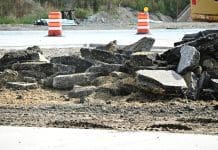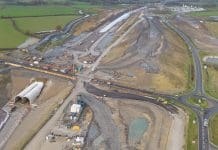International Women in Engineering Day on 23 June celebrated #EngineeringHeroes, the role models who are encouraging young people from all backgrounds to engage with the STEM sector. Sarah Woolham-Jaffier, project manager for the National Grid’s London Power Tunnels, discusses her own journey and the importance of supporting the next generation
Almost 50% of girls aged 11-14 would consider a career in engineering, but this drops to just 25% by the time they reach A-levels. Diversity in recruitment is crucial for the growth and development of the science, technology, engineering and maths (STEM) sector, but with women currently making up only 12% of the UK’s engineering workforce, the industry has a duty to invest in and build a future pipeline of workers that represents students from all backgrounds.
While there are many initiatives to encourage positive representation across STEM, one of the most important – but often overlooked – means to engage young people is through diverse role models. Research from Microsoft found that over half of women with a STEM role model expressed interest in a career in the sector, compared with less than a third without someone they could look up to.
Celebrating pioneers and allies
The theme of this year’s International Women in Engineering Day (INWED) was #EngineeringHeroes, a much-needed call-out to celebrate the pioneers and allies driving positive change across the industry and to encourage young people to engage with STEM by discovering their own role models.
It was thanks to one of my own #EngineeringHeroes that I realised my passion for the industry. A family friend who had set up a construction company from his spare bedroom took note of my interest in the business and offered me a week’s work experience when I was 16. Thanks to his encouragement, I was able to see construction work in action and realised my skillset could be suited to civil engineering as opposed to the architecture career path I was considering at the time.
To this day, I am grateful for his guidance and understand first-hand how influential our role models can be.
Anyone interested in a career in STEM deserves to have a #EngineeringHero that they can relate to and engage with – whether that be a historical figure or a teacher encouraging those from all backgrounds to engage with STEM subjects.
From the outset of my career in engineering, I have stood out because of my age and gender. I have experienced first-hand the lack of representation of women and ethnic minorities in the construction space, particularly in leadership positions. Since joining National Grid, I have found myself working with a more diverse team, though as project manager on the London Power Tunnel’s largest site, the gender imbalance is still evident in some teams.
Our male role models play a vital role in training and developing the pipeline of women entering the industry. I have found many #EngineeringHeroes amongst the men in my team, who can play a just as important role in creating an equal and diverse workforce than women alone. It is the duty of those at the top to act as positive role models and allies, helping to give a platform and voice to those working underneath and alongside.
I have found a particular role model in Peter Townsend, tunnel adviser for the London Power Tunnels project. Peter’s specialist knowledge is breath-taking and throughout the pandemic he has made a considerable effort to support the development of those around him, including four female trainees. When you are a male expert in your field, it can sometimes be difficult to navigate women in engineering initiatives, but we’re reliant on people like Peter giving their time and knowledge to act as a role model and mentor and thankfully many are willing to do so!

Encouraging young people into the industry
Celebrating our #EngineeringHeroes should encourage more young people to engage with the industry, which is crucial for both the economy and a sustainable future. Research has shown that enabling women to meet their full potential in work could add as much as $28tn to annual GDP in 2025. Data from National Grid found that the UK’s energy sector will need to fill 400,000 jobs if it is to meet its target to deliver net zero emissions by 2050. To fill these jobs and attract and retain the talent the industry needs, we must work hard to highlight engineering as a viable and enjoyable career for those from all backgrounds.
Engaging students with role models early in their education is crucial in helping them recognise STEM career routes. Many children won’t have exposure to the diverse range of jobs across the STEM sector. I believe helping them to understand the industry by providing real-life examples is key. I’ve been working with social enterprise MyKindaFuture and charity the St Giles Trust to engage with young people across the route of our London Power Tunnels project in South London and I am hopeful that through my part in this outreach, I’m showing students that women can be our #EngineeringHeroes.
The London Power Tunnel project’s partnership with MyKindaFuture has launched a pioneering STEM skills and careers outreach programme aiming to reach over 100,000 secondary school pupils over the next five years. To date, through a mixture of webinars, workshops and digital mentoring schemes, we have engaged around 19,000 students to inspire them to consider a career in STEM since last September. These types of programmes are crucial for the development of the engineering workforce: 2019 research from the Engineering Council found that young people who had the opportunity to attend a STEM careers activity in the previous 12 months were over three times more likely to consider a career in engineering than those who had not.
As I reflect on the importance of having #EngineeringHeroes, I realise that anyone across the industry challenging stereotypes and contributing to an inclusive workplace is a hero. Fighting for representation and showing that anyone can be an engineer is the key to encouraging the future of the sector.
Sarah Woolham-Jaffier
Project manager, London Power Tunnels
National Grid
nationalgrid@londonpowertunnels.co.uk
Twitter: @NGLPT










![[VIDEO] Heathrow’s third runway plan wins out over Arora London, United Kingdom – May 31, 2023: A commercial airliner taking off at London's Heathrow Airport, representing plans for a third runway](https://www.pbctoday.co.uk/news/wp-content/uploads/2025/11/iStock-2143084103-218x150.jpg)



